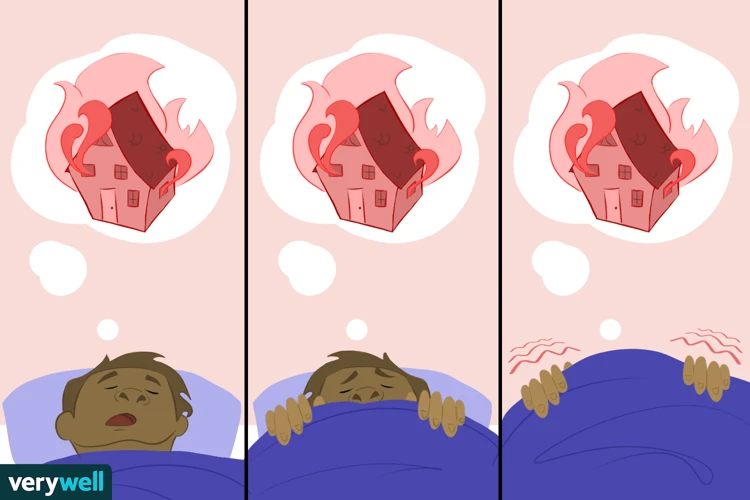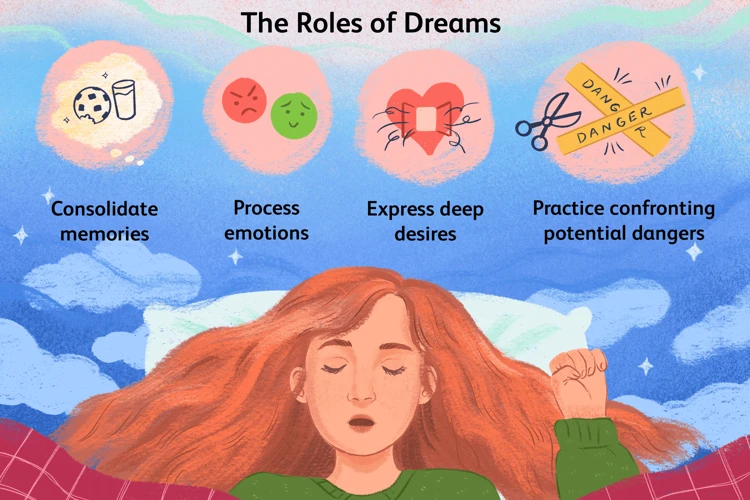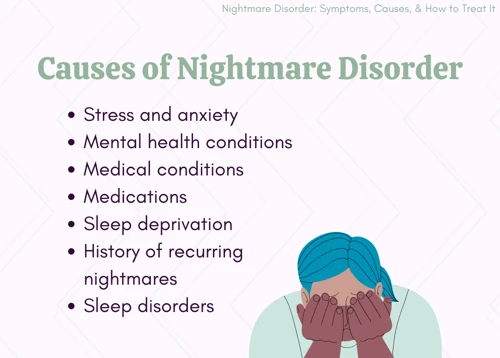Have you ever woken up in the middle of the night in a cold sweat, your heart pounding, after experiencing a vivid and terrifying dream? Nightmares can be incredibly unsettling and leave us feeling shaken long after we wake up. But what causes these unsettling dreams? In this article, we will delve into the world of nightmares and explore the psychological factors that can contribute to their occurrence. By understanding the causes behind these distressing dreams, we can gain insights into our own psychological well-being and take steps towards finding relief and peace of mind. So, let’s journey into the realm of nightmares and uncover the mysteries that lie within our subconscious minds.
What are Nightmares?

Nightmares are intense and disturbing dreams that can occur during our sleep. They are characterized by feelings of fear, anxiety, and dread, often accompanied by vivid and realistic imagery. These dreams can feel incredibly real, causing physical manifestations such as rapid heart rate, sweating, and even waking up in a state of panic. However, it’s important to note that nightmares are a normal part of the dreaming process and are experienced by most people at some point in their lives. They typically occur during the REM (Rapid Eye Movement) stage of sleep, which is when our most vivid and active dreaming occurs. Nightmares often involve themes of danger, threat, or personal harm, leaving a lasting impression upon waking. They can be a result of various psychological factors, including anxiety and stress, post-traumatic stress disorder (PTSD), depression and mood disorders, personality traits, childhood trauma, and substance abuse. Understanding the underlying psychological causes of nightmares can provide valuable insights into our subconscious mind and overall mental well-being. It is important to address the root causes of nightmares to prevent them from becoming a recurring issue that negatively impacts our quality of sleep and daily life.
Psychological Factors Contributing to Nightmares

Nightmares can be influenced by various psychological factors, shedding light on the inner workings of our minds. One significant factor is anxiety and stress. When we experience high levels of stress or have unresolved anxieties, these emotions can manifest in our dreams, often resulting in distressing nightmares. Similarly, individuals with post-traumatic stress disorder (PTSD) may also be more prone to experiencing nightmares as their sleep becomes disrupted by traumatic memories and the accompanying emotional distress. Depression and mood disorders can contribute to the occurrence of nightmares as well, as individuals struggling with these conditions may have an imbalance of neurotransmitters that affect their dream content. Additionally, personality traits can play a role, with those who have a tendency towards negative thinking or high levels of neuroticism being more susceptible to nightmares. Childhood trauma also contributes to nightmares, as unresolved traumatic experiences may resurface during sleep. Substance abuse, particularly the use of certain medications or substances, can interfere with sleep patterns and lead to an increase in nightmares. Understanding these psychological factors helps us recognize the importance of addressing underlying issues to alleviate the frequency and intensity of nightmares and promote healthier sleep patterns.
Anxiety and Stress
Anxiety and stress are common psychological factors that can contribute to the occurrence of nightmares. When we experience high levels of stress or anxiety, our minds are often preoccupied with worries and fears, which can manifest in our dreams as vivid and distressing nightmares. The emotional and physiological responses triggered by anxiety and stress can lead to heightened brain activity during sleep, increasing the likelihood of nightmares. These nightmares may reflect our subconscious concerns and fears, such as failure, public humiliation, or personal danger. Additionally, anxiety disorders, such as generalized anxiety disorder (GAD) or panic disorder, can further increase the risk of experiencing nightmares. Managing and reducing anxiety and stress levels can significantly improve the frequency and intensity of nightmares. This can be achieved through various stress reduction techniques such as mindfulness meditation, deep breathing exercises, regular physical exercise, and seeking support from a therapist or counselor. By addressing and alleviating anxiety and stress, individuals can gain better control over their overall mental well-being and potentially reduce the occurrence of nightmares. Understanding the connection between anxiety, stress, and nightmares is crucial in taking proactive steps towards a peaceful and restful sleep.
Post-traumatic Stress Disorder (PTSD)
Post-traumatic Stress Disorder (PTSD) is a psychological condition that can contribute to the occurrence of nightmares. PTSD is typically triggered by experiencing or witnessing a traumatic event, such as physical or sexual assault, combat, natural disasters, or accidents. Individuals with PTSD often have vivid and distressing nightmares related to the traumatic event they experienced. These nightmares can reenact the traumatic event or contain elements that symbolize the fear, helplessness, and emotions associated with the original trauma. Nightmares experienced by individuals with PTSD can be quite intense and are often accompanied by other symptoms such as flashbacks, intrusive thoughts, avoidance behaviors, and heightened anxiety. The nightmares serve as a way for the subconscious mind to process and attempt to confront the trauma that has occurred. Healing from PTSD and reducing the frequency and severity of nightmares often requires therapy and treatment approaches that specifically address the trauma and promote the development of coping strategies. By seeking professional help, individuals with PTSD can learn to manage their nightmares and alleviate the distress they may cause.
Depression and Mood Disorders
Depression and mood disorders can have a significant impact on our mental well-being and sleep patterns, increasing the likelihood of experiencing nightmares. These conditions often involve persistent feelings of sadness, hopelessness, and a lack of interest or pleasure in activities. The negative emotions associated with depression can infiltrate our dreams, leading to distressing and unsettling nightmares. Nightmares related to depression and mood disorders may involve themes of loss, failure, rejection, or guilt, reflecting our subconscious thoughts and feelings of self-worth. These dreams can be incredibly vivid and emotionally charged, causing us to wake up with a sense of despair or anxiety. Additionally, the disrupted sleep patterns commonly experienced by individuals with depression can also contribute to the occurrence of nightmares. It’s important for those with depression or mood disorders to seek professional help and treatment to address the underlying causes and manage their symptoms effectively, which may help reduce the frequency and intensity of nightmares. By managing depression, individuals can improve their overall psychological well-being and potentially alleviate the occurrence of distressing dreams.
Sources:
– Understanding the Relationship Between Nightmares, Stress, and Anxiety
– National Institute of Mental Health. (2020). Depression.
Personality Traits
Personality traits play a significant role in shaping our experiences, including the occurrence of nightmares. Certain personality traits have been found to be associated with a higher likelihood of having nightmares. Individuals who have a high level of neuroticism, which is characterized by the tendency to experience negative emotions such as anxiety, fear, and sadness, are more prone to experiencing nightmares. Neurotic individuals often have heightened emotional sensitivity and may have a tendency to ruminate on negative thoughts and experiences, which can contribute to the occurrence of distressing dreams. Additionally, personality traits such as openness to experience and creativity have also been linked to the frequency and vividness of nightmares. People who are more open to new experiences may have a wider range of dream content, which can include both pleasant and disturbing imagery. On the other hand, creative individuals may have a more active and imaginative subconscious, leading to the generation of intense and vivid dream scenarios. It’s important to note that while certain personality traits can make individuals more susceptible to nightmares, they do not necessarily guarantee the occurrence of nightmares. Factors such as stress, anxiety, and traumatic experiences often interact with these personality traits to influence the likelihood of nightmares. To learn more about the potential warning signs of recurring nightmares, you can explore our article on “Unveiling the Potential Warning Signs of Recurring Nightmares.” Additionally, if you’re interested in understanding the role of nightmares in processing emotions and memories, we have an insightful article on “The Role of Nightmares in Emotions and Memories.”
Childhood Trauma
Childhood trauma can have a profound impact on a person’s psychological well-being, and it is a known contributing factor to the occurrence of nightmares. Experiences of physical, emotional, or sexual abuse, neglect, or witnessing traumatic events during childhood can leave lasting imprints on the mind. The effects of childhood trauma can resurface in nightmares, as the subconscious mind attempts to process and make sense of these distressing experiences.
Here are some ways in which childhood trauma can contribute to nightmares:
It is important for individuals who have experienced childhood trauma and are struggling with nightmares to seek support from mental health professionals. Therapy, such as trauma-focused therapy or cognitive behavioral therapy (CBT), can help individuals process and heal from the effects of childhood trauma, ultimately reducing the frequency and intensity of nightmares.
Substance Abuse
Substance abuse is a significant psychological factor that can contribute to the occurrence of nightmares. When individuals engage in the excessive use of substances such as alcohol, drugs, or medications, it can disrupt the normal sleep cycle and the brain’s ability to regulate dreams. Substance abuse alters brain chemistry, leading to changes in neurotransmitters and sleep patterns. These disruptions can increase the likelihood of experiencing nightmares. Certain substances, like hallucinogens or stimulants, can directly affect the content and intensity of dreams, often leading to more vivid and disturbing experiences. Withdrawal from substance abuse can also trigger nightmares as the body and mind adjust to the absence of the substance. It is essential for individuals struggling with substance abuse to seek professional help and guidance to address their addiction and manage the associated nightmares. By addressing substance abuse issues, individuals can restore a healthier sleep pattern and reduce the frequency and intensity of nightmares, leading to an improved overall quality of life.
Understanding Dream Symbols in Nightmares

Understanding the dream symbols in nightmares can provide valuable insights into the hidden messages and meanings behind these unsettling dreams. Dreams are often filled with symbolic representations of our subconscious thoughts, emotions, and experiences. By deciphering these symbols, we can gain a deeper understanding of our fears, desires, and unresolved issues. Here are a few common dream symbols that may appear in nightmares and their possible interpretations:
1. Falling: Falling in a dream can represent a loss of control or a fear of failure. It may signify a sense of insecurity or instability in waking life.
2. Being chased: Being chased in a dream often indicates a feeling of being overwhelmed or pursued by some problem or fear in your life. It can symbolize avoiding confrontation or running away from an issue.
3. Teeth falling out: Dreams about losing teeth can symbolize a loss of power or control. It may represent feelings of vulnerability or a fear of aging.
4. Being trapped: Dreams of being trapped or unable to escape can reflect feelings of being stuck in a situation in your waking life. It may point to a need for change or a desire for freedom.
5. Being naked in public: This dream symbolizes vulnerability and a fear of exposing one’s true self or feeling judged by others. It may signify a lack of confidence or a desire for acceptance.
6. Natural disasters: Dreams of natural disasters like earthquakes or tsunamis can represent emotional upheaval or a sense of chaos in your life. It may symbolize a fear of change or a need to release pent-up emotions.
It’s important to note that dream symbols can have different meanings for different individuals, and it’s crucial to analyze them within the context of your own experiences and emotions. Keeping a dream journal can be helpful in identifying recurring symbols and patterns, allowing for a more in-depth exploration of their significance. By unraveling the meanings behind dream symbols, we can gain deeper self-awareness and potentially uncover unresolved issues that may be contributing to our nightmares.
How to Overcome Nightmares
Dealing with nightmares can be a distressing and challenging experience, but there are various strategies and techniques that can help overcome them. One effective approach is to practice stress reduction techniques, such as deep breathing exercises, meditation, and relaxation exercises, which can calm the mind and body before going to sleep. Additionally, seeking therapy and counseling can be beneficial for exploring and resolving underlying emotional issues that may be contributing to the nightmares. Therapies like cognitive-behavioral therapy (CBT) can help identify and modify negative thought patterns and behaviors associated with the nightmares. In some cases, medication prescribed by a healthcare professional may be used to address underlying mental health conditions and alleviate the intensity of nightmares. Keeping a dream journal to track and analyze the content of nightmares can provide valuable insights and assist in identifying patterns or triggers. By understanding the root causes of nightmares and employing these various strategies, individuals can take proactive steps towards overcoming their distressing dreams and improving their overall sleep quality and psychological well-being.
Stress Reduction Techniques
Stress reduction techniques can be effective in reducing the occurrence of nightmares and promoting a more peaceful sleep. Managing stress is crucial as it is a common trigger for nightmares. One technique to consider is practicing relaxation exercises, such as deep breathing or progressive muscle relaxation, before bedtime. These techniques help calm the mind and relax the body, creating a more conducive environment for restful sleep. Engaging in regular physical exercise, such as yoga or meditation, can also help reduce stress levels and promote a sense of well-being. Additionally, establishing a consistent bedtime routine can signal to the body that it is time to wind down and prepare for sleep. This routine can include activities like reading a book, taking a warm bath, or listening to soothing music. Creating a relaxing sleep environment is also essential. Ensure your bedroom is comfortable, quiet, and free from distractions. Consider using blackout curtains, earplugs, or a white noise machine to create a peaceful atmosphere. Taking steps to manage stress through these techniques can promote better sleep and reduce the frequency and intensity of nightmares.
Therapy and Counseling
Therapy and counseling can be highly effective in addressing and overcoming nightmares. Working with a trained therapist or counselor can provide support, guidance, and tools to help individuals process and cope with the underlying psychological factors contributing to their nightmares. One common therapeutic approach is Cognitive Behavioral Therapy (CBT), which focuses on identifying and challenging negative thought patterns that may be fueling anxiety and stress. By reevaluating and restructuring these thoughts, individuals can develop healthier coping mechanisms and reduce the frequency and intensity of nightmares. Another therapeutic approach is Exposure Therapy, which involves gradually exposing individuals to the content of their nightmares in a safe and controlled environment. This method allows individuals to confront and desensitize themselves to their fears, ultimately leading to a reduction in nightmare frequency and intensity. Additionally, therapy and counseling can provide a safe space for individuals to explore and process any traumatic experiences or unresolved emotional issues that may be contributing to their nightmares. Through techniques such as talk therapy, trauma-focused therapy, and EMDR (Eye Movement Desensitization and Reprocessing), individuals can work towards healing and resolution. It’s important to consult with a qualified mental health professional to determine the most suitable therapeutic approach for addressing nightmares and achieving personal growth and well-being.
Medication
Medication can be an option for those struggling with frequent and severe nightmares. When other strategies, such as stress reduction techniques and therapy, have not provided sufficient relief, medication can offer additional support. One common type of medication used for nightmares is prazosin, which is primarily prescribed to treat high blood pressure but has also been found to reduce the frequency and intensity of nightmares. Another medication that may be considered is certain antidepressants, such as selective serotonin reuptake inhibitors (SSRIs) or tricyclic antidepressants. These medications can help regulate sleep patterns and reduce anxiety, which may also have a positive impact on nightmares. However, it’s important to remember that medication should be used under the guidance and supervision of a healthcare professional, as they can assess the potential benefits and risks associated with each type of medication. It’s also essential to keep in mind that medication is not a standalone solution and should be complemented with other therapeutic approaches to address the underlying causes of nightmares.
Keeping a Dream Journal
Keeping a dream journal is a powerful tool for understanding and interpreting our nightmares. It involves recording our dreams in detail as soon as we wake up, while the memories are still fresh. By jotting down the details of our dreams, including any emotions, characters, symbols, or events that stood out, we can gain a deeper understanding of their underlying meanings. As we consistently write in our dream journal, patterns and recurring themes may emerge, giving us insight into the common threads that run through our nightmares.
When keeping a dream journal, it’s important to be as detailed as possible. Write down not only what happened in the dream but also how it made you feel. This emotional context can provide valuable clues about the subconscious messages that the dream is conveying. Additionally, paying attention to the symbols and metaphors present in the dream can help unravel its deeper significance.
Reviewing our dream journal entries over time can help us identify patterns and triggers that contribute to our nightmares. For example, we may notice that certain stressful events or circumstances consistently lead to nightmares. By recognizing these patterns, we can take proactive steps to reduce stress and create a more supportive sleep environment.
Using a dream journal in conjunction with professional dream analysis can also be beneficial. Many therapists and psychologists specialize in dream interpretation and can offer valuable insights into the meaning of our nightmares. They can help us explore the symbolism within our dreams and connect them to our emotions, memories, and experiences.
Keeping a dream journal is a valuable technique for gaining a deeper understanding of our nightmares. It allows us to explore the hidden messages and symbolism within our dreams, leading to personal growth and a sense of empowerment. So grab a notebook and pen, and start capturing the fascinating world of your dreams.
Conclusion
In conclusion, nightmares are intense and distressing dreams that can leave us feeling shaken and anxious. They often occur during the REM stage of sleep and can be triggered by various psychological factors such as anxiety, stress, PTSD, depression, childhood trauma, personality traits, and substance abuse. Understanding the psychological causes of nightmares can help us gain insight into our mental well-being and take steps to overcome them. It is important to address the underlying issues and seek appropriate help, whether through stress reduction techniques, therapy and counseling, medication, or keeping a dream journal. By exploring the symbols and emotions within our nightmares, we can unravel their meaning and gain a deeper understanding of our subconscious mind. Remember, nightmares are a normal part of the dreaming process, but if they become recurrent or significantly impact our daily life, it is important to seek professional guidance for support and resolution. With proper understanding and proactive steps, we can reclaim our peaceful and restful nights of sleep.
Frequently Asked Questions
Why do nightmares occur?
Nightmares can occur for a variety of reasons, including anxiety, stress, trauma, and even certain medications or substances. They can also be a way for our subconscious mind to process and work through emotional experiences.
Do nightmares have any significance?
Nightmares can have significance as they often reflect our underlying fears, anxieties, and unresolved emotions. They can provide valuable insights into our psychological well-being and serve as a catalyst for personal growth and healing.
Can nightmares be a warning sign for mental health issues?
In some cases, recurring or highly distressing nightmares can be a potential warning sign for mental health issues such as anxiety disorders, depression, or post-traumatic stress disorder (PTSD). If nightmares persist and significantly impact daily life, it is important to seek professional help.
How can nightmares impact our sleep?
Nightmares can disrupt sleep and lead to poor quality sleep or even sleep disturbances such as night sweats or sleepwalking. This can result in daytime fatigue, decreased concentration, and overall diminished well-being.
What role do emotions and memories play in nightmares?
Emotions and memories can play a significant role in nightmares. Nightmares often reflect unresolved emotions or traumatic experiences that our subconscious mind is trying to process and make sense of.
Can certain medications cause nightmares?
Yes, certain medications such as antidepressants, beta-blockers, and sleep medications can potentially trigger nightmares. If you experience nightmares as a side effect of medication, it is important to consult your healthcare provider to discuss potential alternatives.
Can lifestyle factors contribute to nightmares?
Yes, lifestyle factors such as high stress levels, irregular sleep patterns, and substance abuse can contribute to the occurrence of nightmares. It is important to maintain a healthy lifestyle and prioritize self-care to promote better sleep and reduce the likelihood of nightmares.
How can I reduce the frequency of nightmares?
There are several techniques that can help reduce the frequency of nightmares. These include stress reduction techniques such as relaxation exercises and mindfulness, therapy and counseling to address underlying psychological issues, medication in certain cases, and keeping a dream journal to track patterns and uncover potential triggers.
Is it possible to overcome nightmares completely?
While it may be difficult to completely eliminate nightmares, it is possible to manage and reduce their frequency through various interventions such as therapy, stress reduction techniques, and lifestyle adjustments. With proper guidance and support, nightmares can become less frequent and have a lesser impact on our overall well-being.
When should I seek professional help for my nightmares?
If nightmares significantly impact your quality of life, persist for an extended period, or are accompanied by other mental health symptoms, it is advisable to seek professional help. A mental health professional can provide appropriate guidance and interventions tailored to your specific needs.








